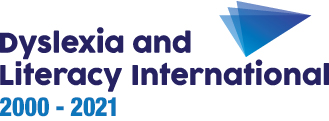Pages in Section 1
1. What is dyslexia?
Dyslexia comes from the Greek and means difficulty (dys) with words (lexia).
There are two main types:
- Developmental Dyslexia, which is an innate profile and the most common;
- Acquired Dyslexia, when a person loses some (dyslexia) or all (Alexia) the ability to read and write as a result of a neurological injury.
Developmental Dyslexia is a lifelong, neurologically-based profile which often runs in families. It manifests in persistent problems with:
- reading
- spelling
- writing
Persons with dyslexia may experience cognitive challenges with:
- Attention
- Concentration
- Auditory Sequential Short-term Memory (ASM)
- Retrieval
- Rapid Automatised naming (RAN)
- Processing Speed
- Organisation
- Sequencing (alphabet, days of the week, months, etc)
Dyslexia forms part of a group of challenges referred to as Learning Disabilities (LD), Specific Learning Difficulties (SpLD) and also, lately NeuroDiverse Profiles. The latest research, also notedy the ICD and the DSM-5, conclude that co-occurence with a number of challenges is more the norm than the exception: for example ADhD and Dyselxia, Dyslexia, Dyscalculia and Visual Stress (Scotopic Sensitivity Syndrome -SSS, or Irlen Syndrome).
Dyslexia is neither the result of low intellectual abilities nor the result of poor schooling, poor home background, and not wanting to learn.
Dyslexia is not caused by poor vision or hearing, or lack of motor co-ordination, although, in some cases, problems with visual and auditory processing and motor co-ordination may occur together with dyslexia.
As we will see in Section 2, it is very important to rule out the possible implication of these physiological factors in explaining the difficulties with reading, spelling and writing. Teachers can suggest that the parents check for physical difficulties such as poor vision or Glue Ear (a history of ear infections and Otitis media), or other physical impairments to learning.
It is generally accepted that people with dyslexia have fundamental problems in relating the written language to the spoken language, and that they experience difficulties with written language – reading, spelling and writing – to different and varied degrees.

But there is a positive side to the picture. Whatever the severity of difficulties with reading and writing, children with dyslexia will often display:

These skills may include:
- a marked spatial ability shown, for example, in building models without using instructions;
- the ability to think deeply about things and to ask pertinent, sensible questions, using advanced vocabulary;
- well-developed social awareness (street-wise);
- the ability to solve problems rapidly and innovatively;
- high performance in geometry, at chess, cards and computer games;
- Superior technological abilities (Good with gadgets).



